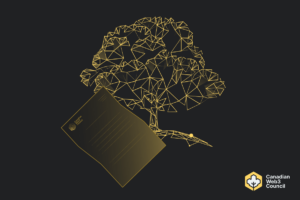Yesterday, the Canadian Web3 Council joined forces with the European Crypto Initiative (EUCI), Blockchain Association Singapore (BAS), and Bharat Web3 Association to submit our input to the International Organization of Securities Commissions’ (IOSCO) consultation on DeFi. Read our full submission here.
This effort marks a major milestone for CW3. Furthering our international efforts is an opportunity to align with our global counterparts and present a united front to regulators around the world. Similarly, we encourage greater cooperation amongst regulatory bodies (both globally and nationally) on web3, and especially on DeFi, given the intersections between DeFi protocols with both traditional financial markets and centralized finance.
In our joint submission, we support a principles-based and risk-based approach to regulation that emphasizes full disclosure of risks, impacts, and benefits to users. Recognizing the dynamic and evolving nature of DeFi and DAOs, we support a regulatory approach that prioritizes proactive guidance and collaboration over punitive measures. A policy approach that balances the competing interests of stakeholders acknowledges the risk mitigation measures, and monitors for any residual risks can help foster innovation and responsible growth in the rapidly evolving landscape of decentralized finance.
Below are highlights of the recommendations in our joint submission:
- A better paradigm in identifying responsible persons by calling for the adoption of a better interpretation of the concepts of “control” and “influence” in the context of DeFi, as well as working on a distinction between the different responsibilities of responsible persons.
- Considering decentralisation as a spectrum instead of a diametrically opposed counterpart to CeFi: “A thorough understanding of the (absence) of control structures in DeFi is key for the regulators and institutions considering their participation or regulation of the ecosystem,” further calling for the “understanding that the technical design of DeFi and the technological stack does not present a mere technicality.”
- The adoption of a bespoke, or ad-hoc, regulatory regime for DeFi is a far more acceptable option than a cogent and likely premature regulatory framework, particularly when it comes to cases where the settlement layer or other stacks, including applications and aggregators, are provided in a decentralised manner with no centrally operated manager exhibiting control.
- Better understanding the specifics of the DeFi governance mechanisms and not relying on traditional governance structures when assessing its functionality and risks. Instead, the authors call for the development of robust methods of classification and evaluation of the DeFi governance mechanisms based on input from the broader crypto community.
The reasons are that “many of the DeFi activities do not fall squarely under the existing frameworks and may be subject to a “progressive decentralisation” or, in fact, “progressive centralisation.” - Tackling the majority of the existing risks through non-coercive measures, such as the issuance of regulatory guidelines and engaging in consultative processes through implementing regulatory sandboxes and safe harbours.
According to the organisations, four elements should be taken into account when assessing the risks and evaluating what regulatory actions should be taken: (1) the threat severity, (2) the probability of occurrence and damage, (3) the impact such risks may have, and (4) the mitigation measures (already) available to the market participants. - More attention towards important technological innovations, such as “smart contract audits,” aimed at tackling some of the existing issues around risk and security in the DeFi space. The authors call for regulators and auditing firms to work together towards building the capacity for more rigorous response mechanisms to ensure the protection of investors and end-users, as well as market integrity.
About our partners
European Crypto Initiative (EUCI), is an advocacy organization based in Brussels, Belgium, that aims to shape EU regulation to favor open, permissionless, decentralized applications leveraging blockchain technology while advocating for an innovative EU environment, supporting technological development for SMEs and innovative crypto-assets service providers (CASPs).
Blockchain Association Singapore (BAS), seeks to empower its members and the community to leverage blockchain and scalable technologies for business growth and transformation. The Association is designed to be an effective and inclusive platform for members to engage with multiple stakeholders – both regional and international – to discover blockchain-based solutions and promote best practices in a collaborative, open, and transparent manner. It aims to promote blockchain literacy for the digital economy in Singapore.
Bharat Web3 Association is the apex body for the leading Web3 technology companies in India, with the aim of leveraging blockchain and scalable technologies to accelerate growth and transformation in India. It advocates for collaboration between the regulatory bodies and the Industry to create awareness about the new age technology and the emerging asset class. The mission of Bharat Web3 Association is to help India realize its vision of being the leading digital economy.



